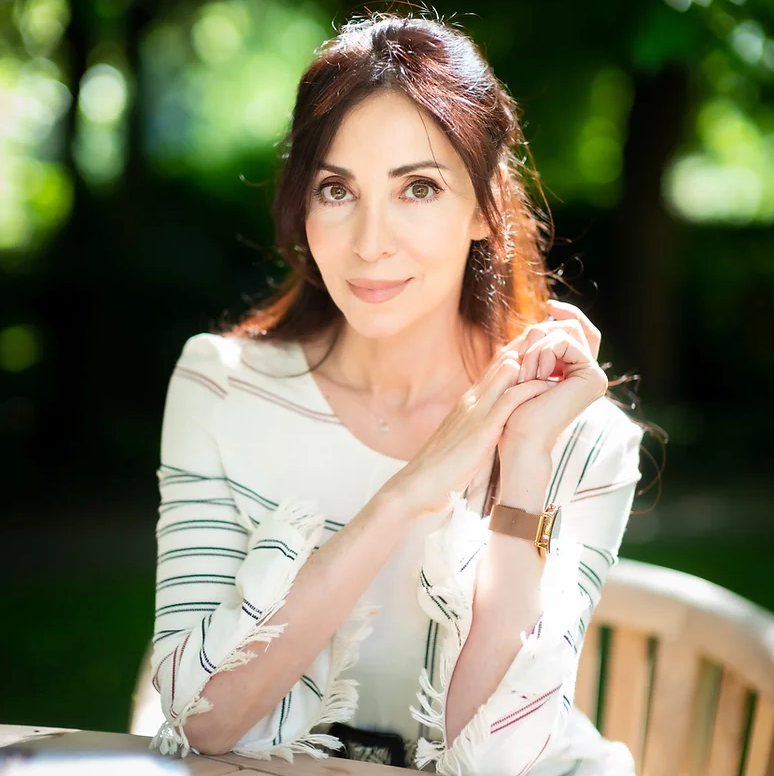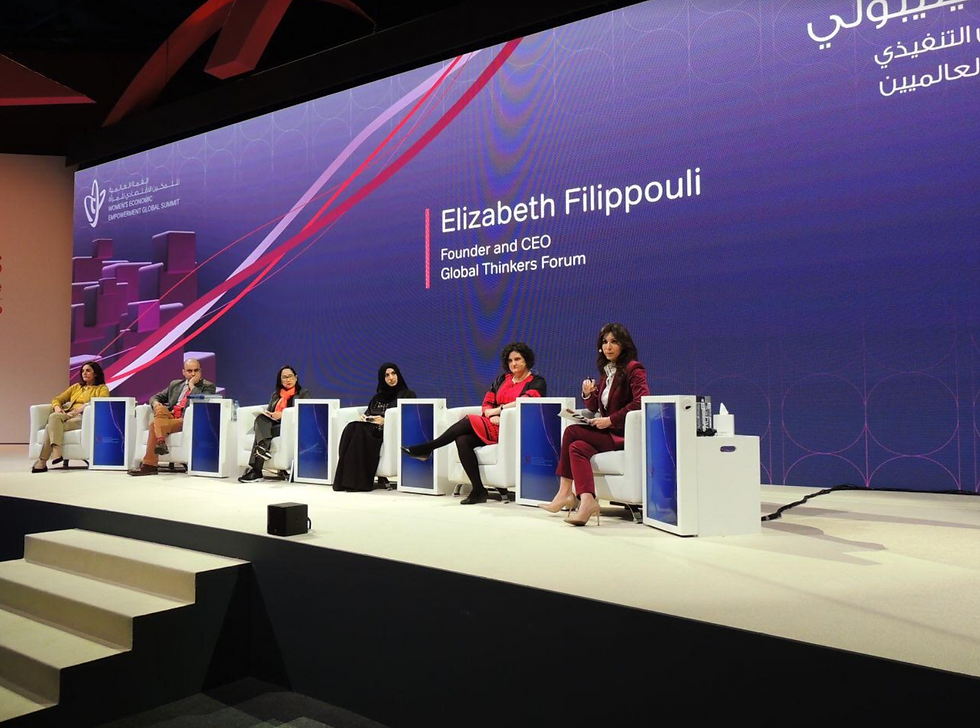Exclusive Q&A with Elizabeth Filippouli KSG '04 ALM '24 (journalist, activist, writer)
- Feb 1, 2024
- 5 min read
Updated: Feb 5, 2024
Elizabeth Filippouli KSG '04 ALM '24 has a 25-year career span across media and social entrepreneurship. Her book FROM WOMEN TO THE WORLD-LETTERS FOR A NEW CENTURY (Bloomsbury, 2021) raises awareness on women as agents of change across different cultures, religions, and social structures. She is the writer and producer of the theatre play ALEXANDER THE GREAT-BETWEEN DREAMS AND IMAGINATION. As a journalist she worked at Al Jazeera English, CNN International and in Greek media. She has an MBA from Oxford’s Said Business School (2011), an MA from London City University (2010) and an ALM in Creative Writing from Harvard University (May 2024).
Q: Your career has spanned journalism, activism, and creative pursuits like adapting and producing a theatrical production inspired by ALEXANDER THE GREAT. How do you balance and draw inspiration from these diverse areas of your professional life?
I draw inspiration from real-life characters and 'the human condition'. One of the great things about journalism is that it thrusts you right into the heart of human stories. Meeting people from all walks of life and social strata and listening to their extraordinary journeys and stories that often sound unreal inspires my theatre and creative writing work. Performing arts, and the Arts in general, have tremendous change-making power. Many established ideas and structures must be updated in our complex and fast-changing world. Theatre and film can help people become more active citizens and better critical thinkers, this is how it all connects in my work.
Q: As a journalist, you've covered geopolitics and interviewed notable figures such as Ted Turner, Al Gore, and Christiane Amanpour. How have these experiences influenced your perspectives on global affairs and storytelling?
They have influenced me a lot. Ted Turner's teen years were marked by traumatic family experiences that built his character and resilience and impacted his approach to life, business, and worldview. He launched CNN as the first 24/7 news network in 1981 when everyone advised him against it. But Turner was way ahead in understanding that technology and globalisation had set the world on a different track, which was irreversible. He donated $1bn to the UN to create the UN Foundation, paving the way to true-impact philanthropy. Christiane is a fearless field reporter and a great interviewer who has always been covering human-centric stories, something I've also been doing in my work across these different fields. When Al Gore lost the presidency, he continued raising global warming and climate change awareness. That life-long activism message is a very important one. We cannot be idle onlookers; we must act as best as possible for this world.
Q: The play you adapted and produced, inspired by 'Alexander the Great,' explores the idea of greatness in leadership. What made the play topical for 2023 audiences?
It is about rethinking the idea of 'charismatic' leadership through a present-day lens. What made Alexander so worshipped and admired by many different cultures through the centuries? I think he was a philosopher-leader who never tried to change the local cultures because he adapted to them, respecting and celebrating diversity. He was eager to learn from others. At the play's heart lies democratising the idea of greatness, openness and continuous learning. The play raises contemporary issues such as war, peace, and the dangers of modern day civilisation as well as technology through metaphors and myth. The combination of Greek philosophy, mythology and history fascinates audiences, because it creatively triggers our imagination. This is the power of storytelling. I am currently working on developing a new production of the play, which is giving the project prospects for a variety of creative iterations.
Q: Your book, FROM WOMEN TO THE WORLD-LETTERS FOR A NEW CENTURY, spans a diverse range of topics in a collection that features women such as Booker-prize nominated Elif Shafak, activist June Sarpong OBE, journalist Mariane Pearl, economist Vicky Pryce, film director Shamim Sarif, and actress/activist Yasmine Al Massri. What inspired you to put this collection together, and what message did you aim to convey through the work?
I envisaged the book as an open dialogue between women and a vessel through which the women in this book are revisiting their relationships with mothers, daughters, friends, mentors, and role models. Ultimately, the relationship with ourselves. The wisdom these women have acquired through the years makes their voices warm and human. They also raise major social issues, including the gender gap, mental health, unemployment and racism, but also personal challenges such as self-doubt, lack of confidence, the constant struggle to find our own identity, and obstacles that prevent women from achieving their full potential. All women in my book are role models of activism: Elif highlights the necessity of compassionate leadership, Shamim writes about her marriage to her wife Hannan and the battles against social bias, and Yasmin has written a powerful poem recounting her childhood in a worn-torn Lebanon, and battling against violence, abuse and trauma.
Q: Being the daughter of a Greek journalist, author and playwright and having a great-great aunt who was the first woman elected mayor in Greece, how has your family background influenced your career choices and perspectives?
We first understand the world through the stories of our ancestors, and then we see the world through the lens of our own experiences. Having a father who was fully dedicated to the writing craft made me appreciate the importance of finding a mission in life to be passionate about and working hard for it. This is a tremendous learning. Find something that speaks to our emotional and creative side motivates us to maximise our potential. It gives us a sense of mission. Also, growing up among artists, actors, and poets liberated my imagination and made me realise the importance of staying connected to our psyche, and our humanness.
Q: Your upcoming projects include both a novel and a theater play inspired by Maria Callas. Can you provide a glimpse into these projects and what themes or messages you plan to explore? How do you balance simultaneously working on two different mediums?
Sure. 2023 marked 100 years from the birth of Maria Callas, a woman whose name became synonymous with Opera in the 20th century. Callas was a true star, not just a celebrity, she was entirely dedicated to her craft. She grew up in complex family circumstances, that included a strained relationship with her mother, her parents' divorce and trying to survive famine and the Nazi oppression in Athens during WWII. Maria had to survive through rigid patriarchal structures and relentless stereotyping. And she made it, she thrived-big big time, becoming a legend. My father knew Maria well, as he did Onassis, and he had also interviewed Maria's mother, Evangelina. So, my play is focused less on the fame, the career and the tragedy of the Diva's final years, as are most plays and films to date. I explore a different side of Maria, her inner thinking, the things she was not talking in interviews about, but also how harsh the press was on her. I shine a light on angles that make Maria more relevant to women today. The novel I work on is an autofiction book loosely based on an investigative story I had covered as a journalist a few years back.
Q: Having worked internationally in places like Greece, the US, the UK, and the Middle East, how have these diverse cultural experiences shaped your storytelling and the themes you choose to explore in your work?
What makes people's stories fascinating is the dramatic side, the human condition. The conflicts we face, the struggles and battles we face daily on a human level, the existential questions, and our constant journey to live life on our way to death. These are common in every culture, so working across different cultures has helped me develop a language of communication that stretches beyond what we call our 'mother tongues'. As humans, we are connected through a more profound language that reflects our common destiny, and this is always present in my work, as much as it is in my life.





Elizabeth Filippouli’s insights into activism, journalism, and the power of storytelling are truly inspiring. Her approach to making a difference through media resonates with me deeply. It's incredible how much effort goes into shaping narratives that have the potential to change the world. I see a lot of parallels between her journey and the preparation for a coding interview. Both require not just skills but the ability to communicate clearly and effectively, whether it's through words or code. This is one reason why refining communication is so valuable—it helps you articulate your thoughts and ideas effectively in any interview setting.